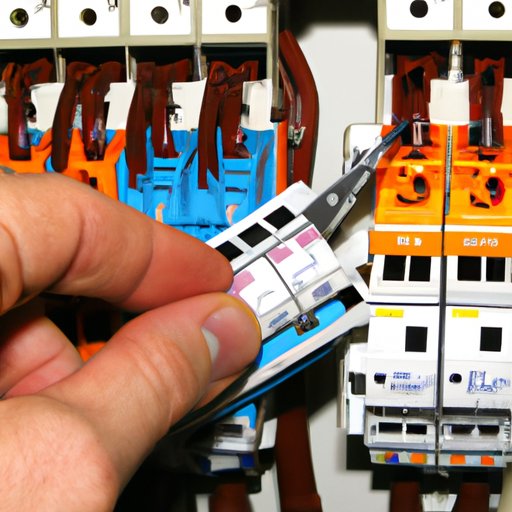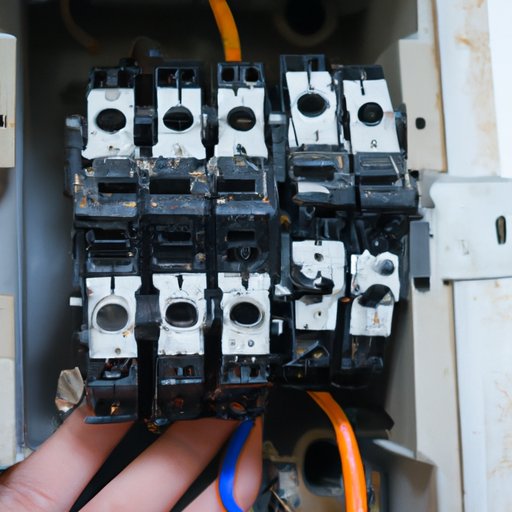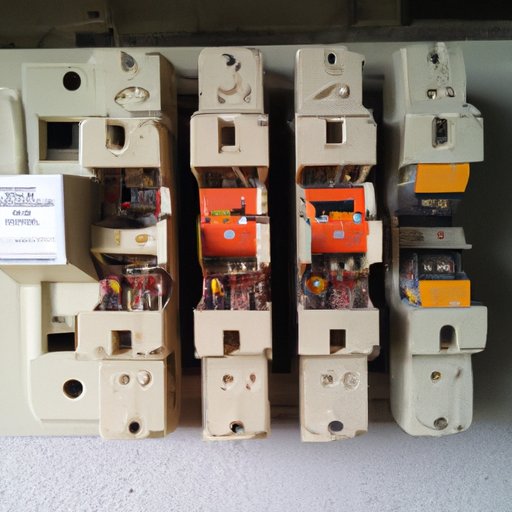Introduction
Circuit breakers are an important safety feature found in many homes. They protect against electrical overloads, short circuits, and ground faults by automatically disconnecting the power supply when necessary. But sometimes these circuit breakers can trip or shut off unexpectedly. So what causes a circuit breaker to trip? This article will explore the various reasons why a breaker may trip and provide tips on how to prevent it from happening.

How to Troubleshoot a Tripped Circuit Breaker
If your circuit breaker has tripped, here is a step-by-step breakdown of the process for troubleshooting:
- First, check the circuit breaker box for any signs of damage or corrosion.
- Next, locate the tripped breaker and reset it by pushing the switch to the “on” position.
- If the breaker trips again right away, there may be an issue with the wiring or appliance connected to that circuit.
- Check the wiring for signs of damage and replace any damaged wires.
- Finally, if the breaker continues to trip, you may need to call an electrician for further assistance.
It is also important to remember that circuit breakers are designed to trip at certain thresholds to protect against potential hazards. If the breaker trips frequently, it could be a sign of a more serious underlying issue. As such, it is important to identify and resolve the problem before it becomes a major safety hazard.

Reasons Why Your Circuit Breaker Keeps Tripping
There are several reasons why your circuit breaker may be tripping, including:
Overloading the Circuit
One of the most common causes of circuit breaker tripping is when too many appliances are plugged into the same circuit. This can cause the circuit to become overloaded, which can lead to the breaker tripping.
Short Circuits
A short circuit occurs when the hot and neutral wires come into contact with each other. This can create a powerful current that can overwhelm the circuit, causing the breaker to trip.
Ground Faults
A ground fault is similar to a short circuit, but instead of the hot and neutral wires coming into contact, the hot wire comes into contact with the ground wire. This can also cause an intense surge of electricity, leading to the breaker tripping.
Arcing
Arcing occurs when electricity jumps through the air between two points. This can occur due to faulty wiring, an exposed wire, or a damaged outlet. Arcing can create a powerful surge of electricity, which can cause the breaker to trip.
Tips to Prevent Circuit Breaker Tripping
There are several steps you can take to help prevent your circuit breaker from tripping, including:
- Avoid overloading circuits by not plugging too many appliances into the same circuit.
- Check wiring regularly for any signs of damage or wear.
- Use surge protectors to help protect your electronics from surges caused by arcing or other power problems.
Exploring the Benefits of Installing Ground Fault Circuit Interrupters (GFCIs)
Ground Fault Circuit Interrupters (GFCIs) are special outlets that are designed to detect ground faults and quickly shut off the power supply when needed. These outlets are especially beneficial in bathrooms, kitchens, and other areas where water and electricity may come into contact. GFCIs can help reduce the risk of electric shock and protect against other power problems.
When it comes to installation, GFCIs should be installed in areas where they are likely to be used. This includes places like bathrooms, kitchens, laundry rooms, garages, and outdoor areas. It is also important to make sure the GFCIs are properly wired and tested before use.
Conclusion
In conclusion, circuit breakers are an important safety feature in many homes. Though they are designed to protect against electrical overloads, short circuits, and ground faults, they can trip unexpectedly. There are several potential causes of circuit breaker tripping, including overloading circuits, short circuits, ground faults, and arcing. To prevent tripping, it is important to avoid overloading circuits, check wiring for damage, and use surge protectors. Additionally, installing Ground Fault Circuit Interrupters (GFCIs) can help reduce the risk of electric shock and protect against other power problems.
(Note: Is this article not meeting your expectations? Do you have knowledge or insights to share? Unlock new opportunities and expand your reach by joining our authors team. Click Registration to join us and share your expertise with our readers.)
